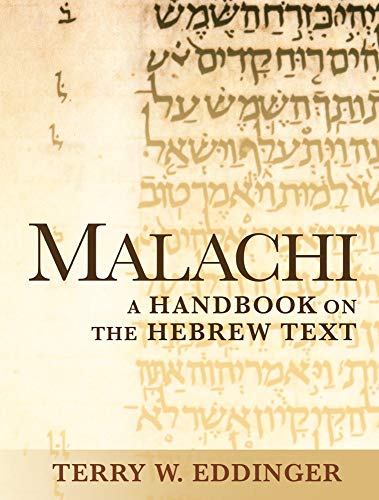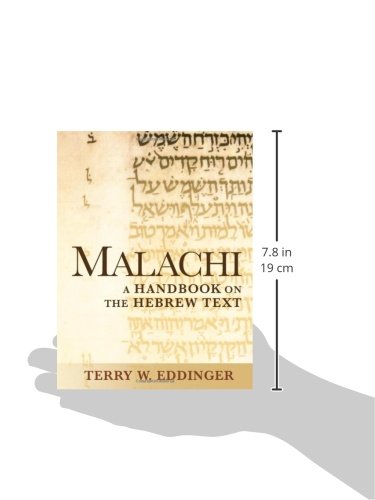Customer Services
Copyright © 2025 Desertcart Holdings Limited
Desert Online General Trading LLC
Dubai, United Arab Emirates



Malachi: A Handbook on the Hebrew Text (Baylor Handbook on the Hebrew Bible)
J**P
Highly recommended for anyone who wants to learn Hebrew
Been using this book for my Hebrew exegesis class in seminary for a few months now. It's short and to the point, but it also takes the time to clarify Hebrew idioms and phrases along with some syntactical use of Hebrew words. Highly recommended for anyone who wants to learn Hebrew.
A**S
A worthy guide through the Hebrew text of Malachi
The Baylor Handbook on the Hebrew Bible series is a deliberately unique contribution to the field of commentaries on the Hebrew Bible. It fills a void. Although the student of the Hebrew of the minor prophets is fortunate to perhaps be able to access Baker's fine exegetical commentary (Malachi is in this volume), there is still a dearth in general of OT commentaries that comment extensively on the Hebrew text and grammar. In that sense I've been happy to see the careful attention this series gives to the Hebrew text. (Bonus: this book and some the others in the series that I've briefly glanced through give good treatment of discourse analysis.)It's important to note from the outset that Malachi (as a book in this series) is not a "full blown commentary" (Holmstedt). It's a "Handbook on the Hebrew Text," which does "not attempt to replace the second step of consulting commentaries and secondary literature...." In keeping with this aim, Terry W. Eddinger gives the reader a short (five pages) introduction, yet it is plenty to be able to work well with the Hebrew text of Malachi. (And a bibliography with references throughout points readers in the direction of other Malachi-related literature.)One commendable feature is the "key words" chart at the beginning of each oracle. Malachi is the first book in this series to offer such a feature. Eddinger highlights important words that the reader will want to know as he or she makes his or her way through a pericope. Then-in what was my favorite part of this book-Eddinger has a chart at the back of the book that lists every Hebrew word in Malachi and verse references for all its occurrences. (Future printings or editions of this book could soup up this chart even more with English glosses of the Hebrew words, for the purposes of vocabulary acquisition.) Several times in making my way through Malachi and this handbook, I referred to the Hebrew word chart. A second appendix lists all the times the "divine messenger formula" occurs in Malachi.Eddinger begins each passage with his own English translation, then analyzes the Hebrew text verse by verse. Any reader will appreciate that Eddinger prints the full Hebrew text of a given verse, then reprints the various clauses and words when commenting on them. (This eliminates the need to constantly refer to another book when using Malachi.) The Hebrew font is large, clear, and easy to read. It's fully pointed and includes the Masoretic markings that one would find in the BHS.I was pleasantly surprised to see that Eddinger discusses textual variants throughout the handbook. He especially focuses on LXX/Septuagint variants that receive attention from the BHS editors.Eddinger gives excellent attention to grammatical and syntactical detail--down to an assimilated dagesh lene (1:13)! He treats clauses as wholes--for example, highlighting word order and fronting for emphasis. And he treats individual words and parts of speech. He never loses the forest for the trees, and he gives the trees their due attention, too. In conjunction with the "key words" chart at the beginning of a section and the appendix of all Hebrew words in Malachi, Eddinger often notes rare Hebrew words as such, giving something of their context in the rest of the Hebrew Bible. He seems to have HALOT, TDOT, BDB, and other technical commentaries readily at hand as he comments on the text.In terms of grammar, his discussion of individual words includes syntax and morphology, with every single word parsed / morphologically analyzed and often more detail than that. Eddinger uses the qatal and yiqtol verb classification system. This may not line up with what every Hebrew student has read regarding tense/aspect in their first-year Hebrew class, but it does (at least according to some) carry significant advantages over "perfect" and "imperfect."I've found the Malachi handbook to be an indispensable companion for reading through Malachi in Hebrew.However, I found myself often distracted (though I didn't want to be) by the presence of typographical errors or comma splices or run-on sentences. I hope future printings can correct these, since they take away from an otherwise great book. There would be no benefit in listing typos here, but there were some 20 or more spots where either a word was misspelled, there was disagreement of number between verb and subject, punctuation was missing, and so on. Fortunately the vast majority of these are in English and so easy enough to spot. (I.e., the reader can trust the Hebrew here.) But the author's English translation sections especially seemed to be in want of a closer edit. I do hope future printings or editions can make adjustments here; I imagine students of Malachi will want to make use of this book for years to come.Eddinger in the end is a worthy guide through the Hebrew of Malachi. The prophets often (suddenly!) shifted pronouns or speakers or subjects in their writing. Who is talking now: God, the prophet, both, or the people? Eddinger coolly walks the reader through such grammatical challenges, and others besides.While the obvious use of Malachi is as a reference work in which to look up a given passage, it reads well as a whole, too. I eagerly await future books in the Baylor Handbook on the Hebrew Bible series.Thank you to Baylor University Press for providing me a free copy, in exchange for an unbiased review. This review is a condensed version of a fuller, two-part review at abramkj.wordpress.com
J**N
Superb Grammatical Commentary on this Literary Pseudo-Prophet!
Professor Terry W. Eddinger's wonderful grammatical [vocables, syntax & morphology] Student Edition of the pseudo-prophetical text, "My Messenger" [Hebrew, mal'ak "messenger or angel"; Angelic 'Messenger' of Yahweh (Malachiah "messenger of YHWH" ='Elohim), Mal 3:1] is a welcome edition to the superb list of grammatical texts on the various Hebrew Texts in the distinguished Baylor Handbook on the Hebrew Bible series. I would suggest that students of this text read Professor H. Utzschneider, "Die Schriftprophetie und die Frage nach dem Ende der Prophetie. Uberlegungen anhand von Mal 1,6--2,16" (ZAW 104: 377-94) before studying this text. There are six disputations in the Malachi Hebrew Text (English Chapter Divisions): First [Mal 1:2--5], Second [Mal 1:6--2:10], Third [Mal 2:10--16], Fourth [Mal 2:17--3:5], Fifth [Mal 3:6--12] and Sixth [Mal 3:13--4:3]. "Schriftprophetie" is prophecy by means of the literary interpretation of older traditions.This Hebrew Text was composed by an anonymous tradent sometime between ca. 480 BCE to 350 BCE. It was definitely composed during the Persian Imperial occupation of Palestine; it has all the markings of the Second Temple period in outlook, language and theological concerns.Once again attention must be drawn to two outstanding problems with these student texts: (1.) careless misprints in the English portion of the texts [the Hebrew Text with its vowel-pointings and cantillation marks are of an unusually high-quality accuracy]; and (2.) more detailed preparation of a competent Hebrew-English vocabulary glossary. How are the young Hebrew student-savants to acquire a mastery of an author's or tradent's (in the case of "Malachi") language and idioms, if a glossary is not provided? This is mental sloth and physical laziness!This is becoming too important of a series not to re-issue all these editions with greater attention to editorial proof-reading [See my Amos review here for a pagination of its vulgar errors].Since Abram gave a brilliant, detailed review of this particular text above, I need not paginate further here.I strongly recommend that intermediate and advance students, as well as young scholars of Hebrew who are just starting out their career, to purchase this volume for their classical Oriental library. Also, Amazon needs to add a sneak inside perusal to motivate sales of this book.Respectfully,John E.D.P. Malin,Lafayette, Louisiana
Trustpilot
3 days ago
1 month ago